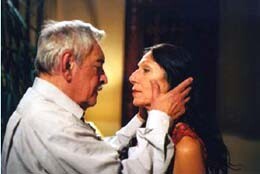The Electronic Intifada 2 May 2005

A film still from “The Eternal Dance”
Said Tabari’s (Gamil Ratib) wife, Faten (Odile Ozagury) is in a coma. While he confidently recites poetry to his ailing wife and makes plans for their future, his daughter Hala (Rim Turki) believes that Said is in denial of her mother’s fatal condition. When she confronts him, “Why don’t you face the facts? She’s leaving us?” Said grows silent. The next day he returns to his wife and adamantly daydreams, “We’ll go back home like two young lovers. It’ll be like before, I promise.” Right at that moment, Faten’s health begins to fail and so does Said’s will.
But The Eternal Dance has an underlying theme that adds another layer to this captivating drama. While Said deals with the loss of his wife, we also observe him experiencing life in a foreign culture. We are not told the back story of how he ended up residing in France, but we are aware that his daughter has raised her daughter, his granddaughter Mena (Marine Bonkobza) there. In a perfectly scripted scene between generations, language symbolizes more than just a form of communication.
Abbas’ direction commands exceptional performances from her seasoned players as they courageously confront the nuances of emotion. When we are not indulged by the subtle gesture of her characters, the camera focuses on the sensuousness of rich fabric and the connection between touch and memory. The Eternal Dance at times feels more like a stage play than a film, but this is not a bad thing. Every suggestive movement, silence and gesture builds to create an unforgettable film dealing with a highly significant subject.
Jenny Gheith is a film critic for the Electronic Intifada
Related links:





